Do Alexa, Siri and Google Assistant use AI?
If you have a smart home, chances are you already use an assistant like Alexa, Google Assistant, or Siri. But do these popular home assistants use AI to function, and if so, how?
Do virtual assistants like Alexa use AI?

Because virtual assistants can listen to voice commands, they benefit from AI-based language processing, as it helps them better understand and respond to voice commands and questions.
All virtual assistants are different, and the type of AI they use is different. However, Machine Learning is a popular technology used by most virtual assistants. Siri, Alexa, and Google Assistant all use AI and Machine Learning to interpret requests and perform tasks.
Alexa uses Machine Learning and NLP (natural language processing) to carry out requests. 'Natural language' is the language used in human conversations, which occur naturally. To best handle voice commands, virtual assistants rely on NLP to fully understand what is being requested.
However, Amazon itself calls this natural language understanding ability NLU. Amazon claims that it uses NLU to "infer what speakers actually mean, not just the words they say" . Amazon uses an example here, saying that NLU helps Alexa provide a weather forecast if the user asks what it is like outside. Although it doesn't specifically say "weather forecast", NLU still allows Alexa to recognize what the user is asking.
Furthermore, Amazon claims that NLU is "all about giving computers the necessary context behind what we say and the flexibility to understand the many variations in how we say the same things." together" . In short, NLU provides the means to better specify what users are asking for when they communicate verbally.
Google Assistant uses NLP and several complex algorithms to process voice requests and engage in two-way conversations. Features like Look and Talk, launching in 2022, use these algorithms to determine whether you, as a user, are just passing by the Nest Hub or intending to interact with the Nest Hub.
Since then, Google Assistant has undergone several updates. In January 2024, Google announced that it would remove rarely used features, such as media alerts and voice control on Google Play Books.
Finally, there is Apple's Siri. Siri is currently using AI for its functions, using both NLP and Machine Learning. Like the other two virtual assistants discussed here, Siri recognizes voice triggers and can receive the trigger phrase "Hey Siri" using a recurrent neural network.
AI assistants are also moving towards using Generative AI. This is a newer type of AI that is currently being used in tools like ChatGPT.
Both Google and Alexa are currently developing Generative AI capabilities for their voice assistants. Google is using Gemini, its own large language model (LLM). On the other hand, Amazon is developing its own LLM which is currently called "Alexa AI".
As Amazon stated, Alexa AI will enable a number of perks, including continued conversations without repeating the wake word, more personalized responses, and control of multiple connected devices via a request.
In July 2023, it was announced that Apple is developing its own LLM, called Ajax, to be used in their chatbot, Apple GPT. In early 2024, reports began to surface that Apple was working to improve Siri using Generative AI. In Bloomberg Power On's report, it is claimed that Apple is "planning an overhaul" for Siri.
More specifically, there is information that Apple is developing AI code, for both Siri and the Apple Care service. 2024 may reveal more information about these developments.
Should Siri, Alexa and Google Assistant be considered AI?
Given how much virtual assistants rely on AI, either through NLP or Machine Learning, it is natural to classify them purely as AI. Voice assistants like Alexa, Google Assistant, and Siri are often called AI tools due to their frequent use of NLP and Machine Learning.
Although these virtual assistants have many other features that do not use AI, they rely heavily on AI to function. Therefore, they can be considered AI.
The future of AI in virtual assistants
One thing many virtual assistant vendors have in common is that they are currently making efforts to use Generative AI in their systems.
Generative AI is a specific field of AI that uses artificial neural networks and Deep Learning to generate text or media content based on user prompts (which can also be in the form of text or images). The introduction of Generative AI in virtual assistants is being done through the integration of LLM.
In the future, AI could be created that could provide virtual assistants with the following capabilities:
- Further personalize the user experience (based on location, interests, etc.).
- Give advice and suggestions for everyday problems.
- Deliver more meaningful conversations with users
As AI continues to become more complex, we can expect to see our trusted voice assistants become more capable, helping us with everything. AI has the potential to bring existing technologies into a new age of possibilities, and voice assistants are no exception.
You should read it
- ★ This is how Siri and Google Assistant help you in dangerous situations
- ★ Amazon Alexa Virtual Assistant is proposed by more than 1,000,000 users in 2017
- ★ Alexa and Cortana can now talk to each other, leaving Apple's Siri and Google Home
- ★ How to set up Alexa virtual assistant as the default assistant on Android
- ★ Amazon entered the big game with Windows PC and Alexa